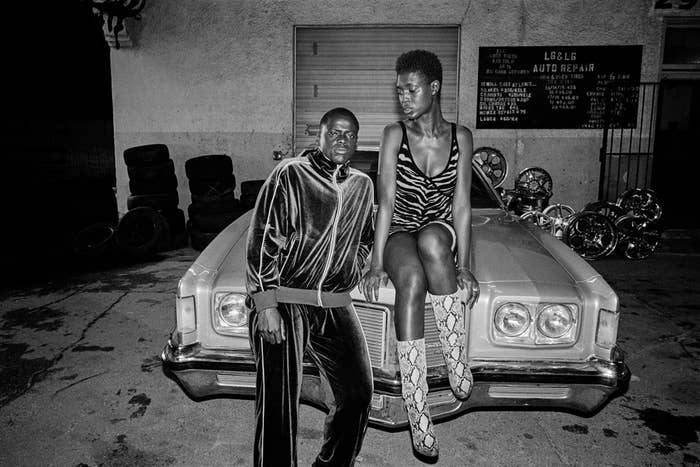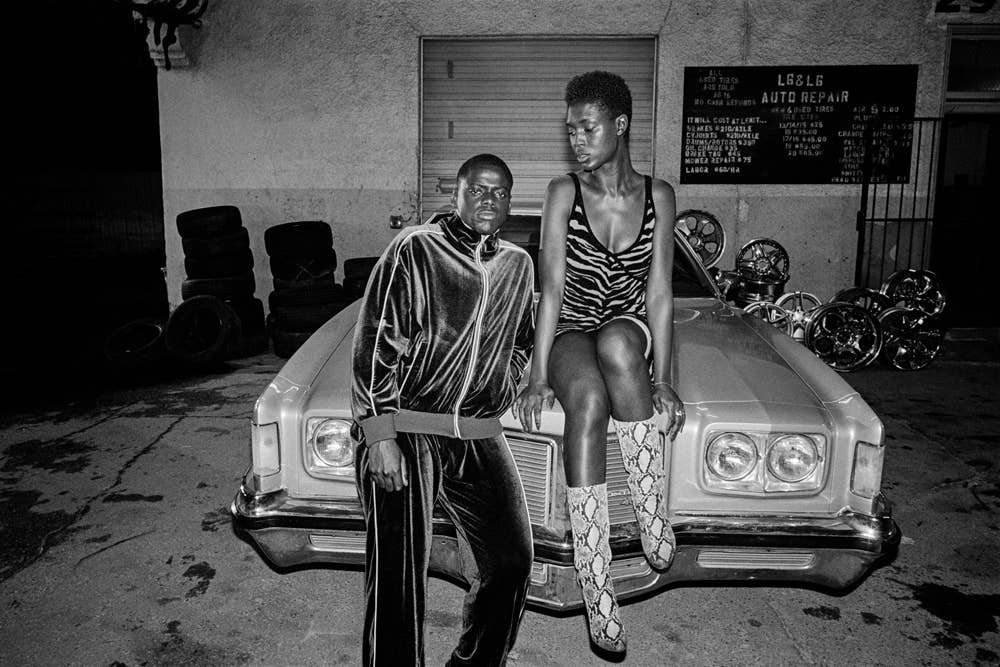
When you’re Living While Black in America, life can come at you fast. There are countless stories of black folk minding their own business and being harassed, assaulted, or gunned down by the police. Rarely do you hear of those roles being reversed—or, at the very least, a situation where an interaction between a black person and a police officer ends with the officer being gunned down. That’s the premise of Queen & Slim, the Daniel Kaluuya-starring project that’s been whispered about for the last six months (and received major buzz during CinemaCon back in April). This film marks the first feature-length project for multi-hyphenate Lena Waithe and Melina Matsoukas (who serve as writer and director, respectively).
The week before Mardi Gras, Universal Pictures sent a select group of African American journalists and outlets to New Orleans to visit the set of what’s been described as a “black Bonnie & Clyde.” The film (which hits theaters on November 27, 2019) is essentially a road movie, taking viewers on a cross-country trek with a black couple featuring the eponymous Queen & Slim—portrayed by fresh-faced Jodie Turner-Smith and Kaluuya respectively—who are on the run from police after their terrible first date turns into a traffic stop that ends with a cop being killed—but Waithe has described it in the past as “protest art.”
“I can't always make it to the marches or the rallies,” Waithe explained during a break in shooting, primarily due to how often she’s working on shows like The Chi or other projects she’s involved in. “When I sit down at my computer, that's me. That's my rallying cry. That's me trying to figure out who we are.” Waithe also understands why some might compare the film to Bonnie & Clyde or Thelma & Louise, but she had a different classic in mind. “It's such a huge compliment. Bonnie & Clyde changed the conversation. Thelma & Louise is iconic. But the thing that they aren't realizing is another reference for me would be Set It Off. In terms of black people being at a very difficult place with their back being against the wall and nothing that they [can] do [but] to keep going.”

Our day started out at the Diamond Jubilee’s truck stop, along a more desolate strip of road in New Orleans. While we spoke with Lena, Melina (who you should know as the visionary behind classic Beyoncé videos, dating as far back as 2007’s “Green Light” but also including 2016’s “Formation”) was overseeing shots of the 1973 Pontiac Catalina that Queen and Slim find themselves pushing during their journey. It’s the whip that the couple spend most of their time in during the film, and is itself a piece that feels like a constant in the script. Waithe, a Chicago native, said she originally wrote the whip to be a Cadillac (“because of my grandmother and the Chicago-ness of it all,” she admits), but it was Melina (who Waithe describes as a “car fanatic”) that chose the car we see in the scenes filmed during our visit.
Set visits can be tricky; while the Queen & Slim set wasn’t on some Marvel Studios-level of secrecy, we could only get so deep into the specifics of the film. Jodie Turner-Smith’s Queen is an attorney who ends up on a first date with Slim, who is working at CostCo at the time the two link up. “Queen goes on this date just as kind of this moment of, ‘I just need to get out and I need to have some connection with somebody,’” Turner-Smith explained. “She's not close to anyone so...she turns to Tinder.” Their date seemingly doesn’t go too well, and they decide to pack it in for the night. Opposites may not have been attracting during their date, but driving from Cleveland (where the film begins) through the Midwest, hopping from car to car to avoid the law, can push people towards common ground. Lena slyly compared Queen and Slim’s relationship to Malcolm and Martin’s, respectively.
“Well, that's so interesting,” Smith said. “That's so true. She's never said that to me but now I'm like, ‘Wow, yeah. Absolutely.’ Queen is more like the militant. She has structured her whole life around this fight to seeing what is happening to black men and black women. Just how the criminal justice system is really kind of structured, a lot of times it's about people not having access to good attorneys or having the money to sort of navigate the system because essentially that's what it's sort turned to. In America, wealth helps you to navigate the system; how many brothers and sisters are in prison or in jail just because they can't afford bail? How often are people forced to sort of take a plea deal? Queen is more of like an Angela Davis kind of character, you know what I mean?”
Kaluuya shared a similar sentiment, but from a different perspective. “I have lived a lot of this shit and that's why it spoke to me. I've been through a lot of certain situations with police. It's life, certain situations with the law can stop that and a lot of my friends can't even get into the country because [of] saying yes to a caution [that] they should not have said yes to at 14 or 15.
“I remember we did the opening scene in Cleveland and it was really triggering for me,” Kaluuya continued. “It kind of messed me up a little bit. It was dark, being in that space. We are so desensitized to that imagery of black people being beaten up by the police that you don't realize that if you [are] beaten up by somebody, you can't actually beat back. I can't beat him up. That's crazy. It's very intimate to me.”
The film is a different take on the state of police brutality and the #BlackLivesMatter movement than we’ve seen before, but it’s a Lena Waithe joint. When asked about how she’d describe the genre of the film she says “Honestly, it's sort of like us to me; it's so funny, you say is it a comedy or drama, but like our life is made up of all those things.”
Waithe, being busy on any number of projects, broke down the process behind writing this film, which was sparked by a conversation with James Frey (of A Million Little Pieces fame), who she said basically broke down the beginning of a film that he knew he couldn’t write. “I wrote [Queen & Slim] during a very terrible time in the first season of The Chi,” Waithe shared, “and I was struggling to get power on my own show. [Writing the film] was very much a protest, because I wasn't really able to write as much on the show as I wanted. I didn't have as much control over the creative. So I say, ‘Oh, I'm going to do the thing that God put inside of me, which is to write.’ And so I did that. I wrote a lot. I'm just happy that in the midst of all that darkness and drama on the first season of The Chi, this was born out of it. Which to me is an essence of the black experience.”
After breaking for lunch and getting a tour through the pre-Mardi Gras streets of New Orleans, we rolled to a busier part of the city. A spot called Vic’s Auto Glass was the location for the second scene of our visit, where Queen and Slim talk numbers with a mechanic—the Pontiac needs service, and they need to have it done fast. “They meet a guy, a mechanic who is aware of who they are and maybe isn't too happy about what they did,” Waithe shares. “[He’s] not really on their side, [and] happens to be older black man who’s like ‘you all may think you all revolutionaries,’ and they don't think that. He's like, ‘but actually, you may be fucking up some people that you don't even know you're fucking up.’” The exchange comes off extremely terse and aggressive, even though he agrees to take their money ultimately.
During this break in filming, the family atmosphere of the set shone through. Lena, Melina, Shiona Turini (the film’s costume designer), and more are laughing and very jovial. Some were thumbing through Jay and Bey’s OTR II tour book while Daniel and Jodie were taking press photos; others were passing around King cake and discussing the local foods they have and haven’t eaten yet. We got to see how well Lena and Melina worked with each other; there was a connection that Lena shared was there from the beginning.

“We both have chemistry,” Lena stated plainly. She spoke on how, when Matsoukas helmed the “Thanksgiving” episode of Master of None (the seminal installment that Waithe wrote and won an Emmy for), Lena thought Melina was a great pick to direct. “Melina was like, ‘no man, we're about to be friends. This about to be a thing.’” Melina, who called their Master of None collaboration “perfect,” said that she had been looking to do her first feature for a while. Luckily for Waithe, who was working on the script when she first approached Melina about directing it, Melina fell in love with the story—she was firm in noting that the passion she feels for a script or idea is what drives her—and they went all in on what could be one of the more compelling films to hit during awards season.
It’s hard to not feel some kind of way, being a Black man, visiting the set of a film like this. It’s a story that feels so necessary for today’s world as African Americans, featuring rising stars and fresh faces, being created by two women who’ve been at the forefront of black creativity. Part of me wants—needs—for this film to win, and based on the morsels of story and camaraderie we were exposed to on this quick trip to the Big Easy, Queen & Slim is a film that everyone should be riding shotgun on.

